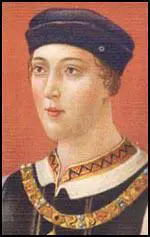King Henry VI

Henry, the only son of Henry V and Catherine of Valois, was born in 1421. Henry became king of both England and France when he was only nine months old. However, he did not take over the government of these two countries until 1437.
Henry was an intelligent man who took a keen interest in education, being the founder of both King's College, Cambridge (1440) and Eton College (1441). He disliked all forms of bloodshed and frequently pardoned condemned criminals. Henry also showed little interest in military matters and was the first English king not to enter the battlefield.
Lacking leadership, the English gradually lost all their territories in France except for Calais. In 1453 Henry suffered his first bout of mental illness. Richard, Duke of York, was temporarily made protector of the realm. Henry's family, the Lancastrians, did not like this decision. Eventually this disagreement led to armed conflict (the Wars of the Roses) between the Lancastrians and the Yorkists.
In 1461 the Lancastrians were defeated at the Battle of Towton. Henry and his wife, Margaret of Anjou, were sent into exile and Edward IV became king.
Edward had difficulty keeping the support of his nobles. They were particularly upset by his decision to marry Elizabeth Woodville without first seeking their advice. The nobles objected to Elizabeth because she did not have royal blood and was the widow of a Lancastrian knight.
In 1470 the Earl of Warwick forced Edward into exile and put Henry VI back on the throne. The following year Edward IV returned and in April, defeated and killed the Earl of Warwick at Barnet. He destroyed the remaining Lancastrian forces at Tewkesbury in May, 1471. Henry was captured and later executed.
